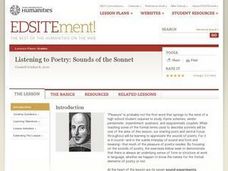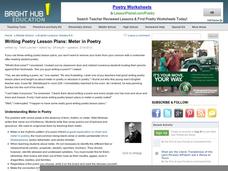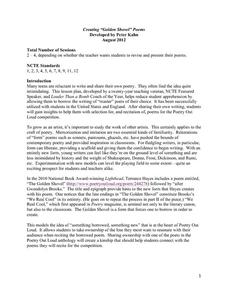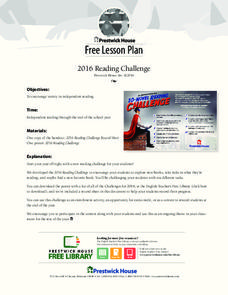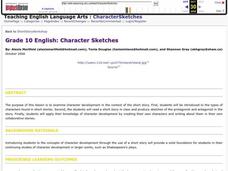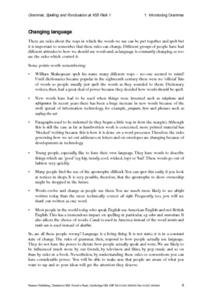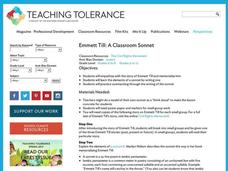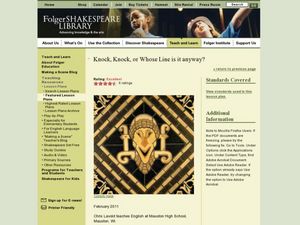Southern Nevada Regional Professional Development Program
Reading Literature - The Ruin
Cross-comparison, the technique of focusing on two different texts with the same themes, motifs, events, etc., is employed in an exercise that asks groups to examine two different translations of “The Ruin,” a poem, written in Old...
Curated OER
Problematic Situation: Romeo and Juliet
Is it ok to be mad at someone who comes to your party uninvited? What about someone who interrupts you? For this prereading strategy, your class members must decide whether or not they'd get angry in the 10 situations provided. Then,...
Global Oneness Project
Clowning Around
Being a clown is hard work — no joke! Emmanuel Vaughan-Lee's Laugh Clown Laugh, a short film about German clown Reinhard "Filou" Harstkotte, asks viewers to consider the various roles played by clowns and to consider the implications of...
Curated OER
From Page to Stage
Students, utilizing video clips and Web sites, compare specific passages from original texts to moments in Broadway musicals on which they were based, analyzing similarities and differences between them. They adapt literature into a...
BBC
Tudors: Life and Society
Here is an interesting lesson that lets kids explore what life was like during the Tudor period. The lesson is written two different ways, one for computer use and one without. It is also written with special instructions for children...
Curated OER
Listening to Poetry: Sounds of the Sonnet
Students investigate how sound influences meaning in poetry by listening to sonnets. They write an analysis after listening to and reading sonnets.
Curated OER
It's All an Allusion: Identifying Allusions, in Literature and in Life
To allude, or not to allude, that is the question: whether ‘tis better to make a reference and engage your audience or risk confusing them or sounding dated. After reading an article about, and loaded with allusions, class members take a...
Southern Nevada Regional Professional Development Program
Close Reading in the Classroom
Close reading is key to the analysis and interpretation of literature. A close reading of the title and the epigraph of “The Love Song of J. Alfred Prufrock” offers readers an opportunity to examine how even single words or names can...
Curated OER
Meter in Poetry
A good poem has form and structure built into it. Middle schoolers see that the structure of a poem consists of stanza, form, rhyme, and meter. The structure also contributes to a poem's meaning. After listening to, and discussing, a few...
Curated OER
What Are the Advantages and Disadvantages of Conforming?
Dive into Arthur Miller’s The Crucible and determine what it means to conform in society, and discuss as a group with the thoughts and plans available in these documents. Included are multiple activities and brain targets that form the...
Poetry Out Loud
Creating "Golden Shovel" Poems
Get even your most reluctant pupils reading, writing, reciting, and maybe even enjoying poetry! A four day lesson, young writers learn about Golden Shovel poems: a poem format that uses borrowed words from other poems as the last words...
Prestwick House
Reading Challenge
One of the big challenges of assigning independent reading is helping class members find a book to read. Another is encouraging readers to read a variety of genres. Never fear, help is here in the form of a quest that asks individuals to...
Utah Education Network (UEN)
7th Grade Poetry: Assess
To assess what scholars have learned throughout a five-lesson poetry unit, seventh graders first craft a Shakespearean sonnet based on a poem they have studied. In part two of the assessment, scholars complete a four-texts performance task.
Curated OER
Sonnet Explication
Students analyze close readings of poems, looking up words in the dictionary, and discussing the major parts of dictionary definitions, including word origin and parts of speech. They examine sonnets, then compare/contrast their findings.
Curated OER
Who Wrote That?
Students explore the Project Gutenberg website and conduct a webquest to answer questions about well known literature and authors.
Curated OER
Poet James Whitcomb Riley: Famous in His Own Day
An engaging biography of "Hoosier" poet James Whitcomb Riley serves as a springboard for study of his unique dialect-based verse. Several activities illuminate differences between spoken vernacular and formal language. Learners record...
Curated OER
Character Sketches
Students are introduced to the types of characters found in short stories. They read a short story in class and produce sketches of the protagonist and antagonist. Finally, they create their own characters and write about them in their...
Curated OER
Introducing Grammar: Grammar, Spelling, and Punctuation
Focusing on correct grammar usasge as well as the concept of language evolution, this conventions lesson prompts middle and high schoolers to examine the structure of sentences and word classes (parts of speech). Use the three activites...
Curated OER
Emmett Till: A Classroom Sonnet
Who is Emmet Till? An important historical figure, your kids will be shocked by his story! Discover the details of his life and collaborate to write a crown of sonnets in the style of Marilyn Nelson.
Curated OER
World History People Review
Who's who in World History? Help your historians keep track of major figures with this World History People Review, where pupils match 96 world figures to the appropriate descriptions. The matching questions are grouped by historical era...
Curated OER
Reviving the Renaissance
Bring the Internet and the Renaissance together in this presentation assignment. Middle schoolers give a presentation on the Renaissance, using computers to both research and create the slides. The lesson includes a short assessment as...
Curated OER
Julius Caesar: iambic pentameter
Read in iambic pentameter! Read Julius Caesar and Macbeth to study the famous meter. While the instructional activity points out the specific passages to use, you'll have to find them and copy them yourself.
Curated OER
Knock, Knock, or Whose Line is it Anyway?
Students compare two versions of Macbeth and participate in improvisational acting. In this improvisational instructional activity, students read and discuss the text before watching two different versions of the film. Students...
Curated OER
"I am not what I am"
Students make connections between their own epithets and those used in Othello.
Other popular searches
- William Shakespeare
- Shakespeare Sonnets
- Shakespeare in Love
- Rhyming Couplets Shakespeare
- Shakespeare in Love Film
- Shakespeare and Macbeth
- Esl and Shakespeare
- Shakespeare Phrases
- Shakespeare Activity
- Shakespeare Acting
- Shakespeare Julius Caesar
- Shakespeare Lesson Plans







